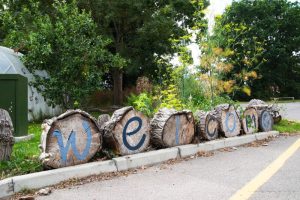Over the past few weeks the University has been doing a lot of internal auditing as it prepares for four days of ISO14001 auditing of its sustainability management system. As a response to the increasing need for graduates to demonstrate true work experience – the Sustainability Team saw this as a perfect opportunity to get students involved and provide some professional auditing experience.
Students from the Sustainable Futures MSc course and the Environmental Conservation MSc received internal auditor training from the Sustainability Team then accompanied them on audits of the Avery Hill and Medway Campuses. ISO14001 is the world’s most widely recognised environmental management system accreditation (used in 159 different countries) and demonstrates organisations that are working to ensure legal compliance and moving towards best practice for environmental management. Many of the students will end up using systems based on the ISO14001 requirements if they move into environmental management roles once they graduate, hence auditing the system provides them a fantastic opportunity for experiencing it firsthand.
The students ended up being involved in walk-round audits of both campuses, audits of kitchens on campus, the grounds storage areas, waste storage areas and also audited some of the documentation including the Sustainability Policy, Environmental Aspects & Impacts Register and the Sustainability Objectives & Targets.
A typical item the students were checking for on the walk-round and waste storage audits would be an item of waste that is classed as hazardous (e.g. batteries, electrical equipment , oils, chemicals) stored incorrectly or in the wrong area. If they found anything like this they would decide whether it is a major or minor non-conformance or just an observation. Once the non-conformance or observation has been reported and written up by the students the Sustainability Team would take the necessary corrective action. For example if the auditors found an item of electrical equipment stored with general waste that is not designed for electrical waste they would then feed this information back to the campus management team and ensure the responsible persons were informed of the correct action and legal requirements.
The students were not just looking for things that are wrong though; there is room in the auditing process to note items that are examples of best practice or being done particularly well. The students auditing the kitchens found huge enthusiasm and good knowledge from the chefs and catering staff for the sustainable and Fairtrade food that they were serving.
The experience of doing the audits and reporting on them will be an invaluable experience for the students involved and is intended to fill any potential employers with confidence in the student’s ability to transfer from sustainability scholars to sustainability professionals. Aside from this, the experience has been hugely positive for the University as well as it moves towards gaining ISO14001 accreditation. The internal auditing process is key in ironing out any problems with the management of the campuses from a sustainability or environmental point of view, and the items that our students picked out over the course of the audits are being actioned now in time for our external ISO14001 auditors arriving.









